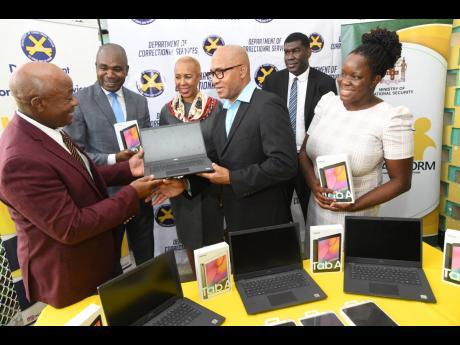Dept of Correctional Services prepares wards for ‘jobs of the future’
South Camp Juvenile Remand and Correctional Centre now offers courses in robotics and coding
Published:Thursday | October 6, 2022 | 12:06 AMSashana Small/Staff Reporter
WARDS AT the South Camp Juvenile Remand and Correctional Centre are now being offered courses in robotics and coding.
Deputy commissioner of rehabilitation and probation aftercare services in the Department of Correctional Services (DCS), Dr Marc Thomas, told The Gleaner that these areas will prepare the wards to take advantage of the “jobs of the future”.
“The idea is to ensure that the children here are excited about STEM education. We’re introducing an introductory programme in coding and robotics, and that should hopefully be the start of getting them excited and participating in that skill,” he said.
He said 14 wards are currently enrolled in such classes but he expects that the numbers will increase as the programme is expanded to other centres.
The DCS deputy commissioner was speaking on Tuesday at the handover ceremony of ICT devices to the juvenile centres managed by the DCS. Sixty-three laptops, 120 tablets and four projectors were donated to the institutions by e-Learning Jamaica.
Thomas said that the donation will allow the centres to expand their academic offerings, among other benefits.
“We are no longer limited to the few devices that we have in our computer lab. We will immediately be able to expand the provision of remote therapy and have more mentors interact with their mentees. We will also immediately expand on our virtual court sessions held. These donations will help to keep those family bonds strong by facilitating those virtual family sessions,” he explained.
Currently, he said, the juvenile centres offer remedial reading, mathematics, social studies, art and craft, music, and English.
English, mathematics, social studies, history, principles of business, principles of accounts, office administration, electronic document preparation management, human and social biology and geography at the Caribbean Secondary Education Certificate level are also offered.
Additionally, the deputy commissioner shared that some wards are pursuing tertiary education.
“At this moment, across our correctional facilities, there is an inmate learning how to read and write, there is another pursuing CSEC and another taking a college degree course,” he said.
Wards ages 12-18 are placed in juvenile centres and it is mandatory for them to attend classes.
While stressing the importance of education in the reintegration of wards into society, he acknowledged that there are challenges with the process.
“We anticipate the stigma … most persons will probably face a challenge in getting hired in the traditional sectors. So we give them the skills so that they can be self-employed, but we’re definitely appealing to the wider society that if you have the opportunity to check them out, please hire them,” he pleaded.
Meanwhile, Thomas lamented that there is a lack of adequate teachers in the system, pointing out that there are currently over 100 vacant posts.
“If anybody wants to come and teach, we have space. We need academy teachers, we need vocational teachers, physical education teachers and sports coordinators. There is also a lot of stigma attached to working in a correctional facility but, if you’re committed to national development, this is where you need to be,” he said.

